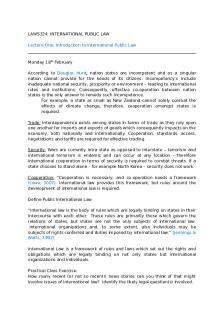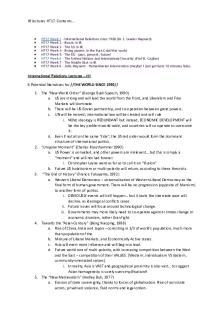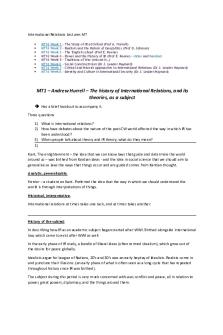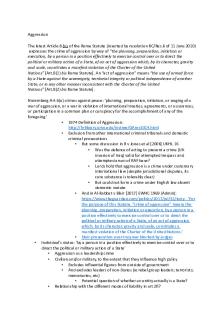International Law - Lectures PDF

| Title | International Law - Lectures |
|---|---|
| Author | Hannah McCarthy |
| Course | International Public Law |
| Institution | University of Canterbury |
| Pages | 84 |
| File Size | 2 MB |
| File Type | |
| Total Downloads | 126 |
| Total Views | 519 |
Summary
LAWS324: INTERNATIONAL PUBLIC LAWLecture One: Introduction to International Public LawMonday 18 th FebruaryAccording to Douglas Hurd, nation states are incompetent and as a singular nation cannot provide for the needs of its citizens. Incompetency’s include inadequate national security, prosperity o...
Description
LAWS324: INTERNATIONAL PUBLIC LAW Lecture One: Introduction to International Public Law
Monday 18th February According to Douglas Hurd, nation states are incompetent and as a singular nation cannot provide for the needs of its citizens. Incompetency’s include inadequate national security, prosperity or environment – leading to international rules and institutions. Consequently, effective co-operation between nation states is the only answer to remedy such incompetence. For example, a state as small as New Zealand cannot solely combat the effects of climate change, therefore, cooperation amongst states is required. Trade: Interdependence exists among states in terms of trade as they rely upon one another for imports and exports of goods which consequently impacts on the economy, both nationally and internationally. Cooperation, standards, access, negotiations and tariffs are required for effective trading. Security: Wars are currently intra state as opposed to interstate – terrorism and international terrorism is endemic and can occur at any location – therefore international cooperation in terms of security is required to combat threats. If a state chooses to stand alone – for example North Korea – security does not work. Cooperation: “Cooperation is necessary; and co-operation needs a framework (Lowe, 2007). International law provides this framework, but rules around the development of international law is required. Define Public International Law “International law is the body of rules which are legally binding on states in their intercourse with each other. These rules are primarily those which govern the relations of states, but states are not the only subjects of international law. International organisations and, to some extent, also individuals may be subjects of rights conferred and duties imposed by international law.” (Jennings & Watts, 1992). International Law is a framework of rules and laws which set out the rights and obligations which are legally binding on not only states but international organizations and individuals. Practical Class Exercise: How many recent (or not so recent!) news stories can you think of that might involve issues of international law? Identify the likely legal question(s) involved.
o o o o
o o o
Syrian Civil War – intervention by Russia and US; chemical bombs/crimes against humanity; refugee crisis. Trump Administration Extraditions and International Warrants for Arrest – Kim Dot Com & Julian Assange. Chinese Occupation of South China Sea via artificial islands; Dispute between China and Philippines; Hague decision having been ignored by China. CPTPPA. Nuclear Weapon Disbarment Treaty Brexit.
Lecture Two: Principles, Nature and Functions of International Law.
Monday 25th February The purposes and functions of International Law include acting as a mechanism to control/constrain states to keep peace and prevent total anarchy; providing state accountability in relation to their own citizens; is a guideline as opposed to a strict law but does regulate economic and trade behavior, formalizes human rights and creates standards for conflict etc. Realism views international law as reflecting state power. Sources of International Law – unusual feature is the indeterminate nature of international law. 1945 Statute of the International Court of Justice, Article 38 (1) The Court, whose function is to decide in accordance with international law such disputes as are submitted to it, shall apply: a. international conventions, whether general or establishing rules expressly recognized by the contesting states; b. international custom, as evidence of a general practice accepted as law; c. the general principles of law recognized by civilized nations; d. subject to the provisions of Article 59, judicial decisions and the teachings of the most highly qualified publicists of the various nations, as subsidiary means for the determination of rules of law. (2) This provision shall not prejudice the power of the Court to decide a case ex aequo et bono, if the parties agree thereto. Can be drawn upon by the judges of the ICJ to determine the law. Is the general starting point in determining the sources of law. Sets out three primary and two subsidiary sources of law.
Primary – (1) Treaties: international conventions that establish rules (2) International Custom: general practice accepted as law (3) general principles of law Subsidiary – (1) judicial decisions (2) writings of highly qualified publicists. Although there is a hierarchy within the primary and subsidiary – there is no hierarchy between the primary sources. Article 38 is no longer regarded as an exhaustive list – it is now a starting pointing as to establishing the sources of international law. Put simply, it is no longer the case that international law is ‘made’ by a finite number of entities (states) through a handful of intergovernmental processes. Today, international law is made in a large number of fora, including multilateral processes, tribunals and the organs of international organizations. In addition, although states remain the primary makers of international law, they are joined by other participants such as international organizations and judges as well as entities which are influential in the making of international law, including non-governmental organizations (NGOs) and even individuals. That these activities are increasingly disparate, with different rule and practices being developed in different areas, by a number of entities, with little by way of coordination, reflects the decentralized approach to the making of international law. A. N. Pronto, “Some Thoughts on the Making of International Law” 19 (2008) European Journal of International Law 601 – 616 at 602 Whilst Pronto is correct in identifying the broad range of sources – but we must identify the instrument that creates legal obligations. If international law is understood as a distinct body of principles, rules and norms having legally binding character for states and other actors constituting the international community, the major problem which arises in determining its content is the question of the formal criteria of validity distinguishing legal rules from other normative prescriptions operating within the same socio-political environment. G. Danilenko, Law-Making in the International Community (1993) at p. 17 Custom International Law – we invoke rules of custom everyday but struggle to agree upon the definition. “International custom, as evidence of a general practice accepted as law . . .”
o o
The word evidence refers to natural law and therefore reflects custom is a higher rule evidenced by the state practice. Custom = state practice + opinion juris (state belief) = conduct they beliece is required by law. Saint Augustine of Hippo wrote in book eleven of his Confessions: “What, then, is time? If no one asks of me, I know; if I wish to explain to him who asks, I know not.” The attitude of international lawyers towards customary international law is somewhat similar; they invoke rules of customary international law every day, but they have great difficulty in agreeing on a definition of customary international law. M. Akehurst, “Custom as a Source of International Law” (1974 - 75) BYIL 1 at p. 1
We will be exploring the concept of custom through a topical case study. On 29 August 2013 the UK government issued a position statement regarding the legality of military action in Syria following the chemical weapons attached in Eastern Damascus on 21 August 2013. Sadly, there have now been allegedly six uses of chemical weapons in Syria, the most recent in early 2018. “If action in the Security Council is blocked, the UK would still be permitted under international law to take exceptional measures in order to alleviate the scale of the overwhelming humanitarian catastrophe in Syria by deterring and disrupting the further use of chemical weapons by the Syrian regime . . . (i)
(ii) (iii)
There is convincing evidence, generally accepted by the international community as a whole, of extreme humanitarian distress on a large scale, requiring immediate and urgent relief; It must be objectively clear that there is no practicable alternative to the use of force if lives are to be saved; and The proposed use of force must be necessary and proportionate to the aim of relief of humanitarian need and must be strictly limited in time and scope to this aim.”
The UK assert (under customary law) the right to intervene militarily to use chemical weapons. Article Two, UN Charter. Use of force for exception of Humanitarian Purposes.
Elements of Custom Requirements: 1. General practice/State (continuous/uninterrupted)
Practice
–
conduct
of
state
2. Accepted as law /Opinio Juris - Motiviation (What states believe to be the required conduct by law.) Therefore – a state acts in a particular way continuously because they believe that that action is required by law. Both elements are required for the practice to become a custom.
Case Study: North Sea Continental Shelf Case: FRG v Denmark; FRG v Netherlands (1969) I.C.J Reports 3 at p.44. “Not only must the acts concerned amount to a settled practice, but they must also be such, or be carried out in such a way, as to be evidence of a belief that this practice is rendered obligatory by the existence of a rule of law requiring it. The need for such a belief, i.e. the existence of a subjective element, is implicit in the very notion of the opinio juris sive necessitatis. The States concerned must therefore feel that they are conforming to what amounts to a legal obligation. The frequency, or even habitual character of the acts is not in itself enough. There are many international acts, e.g. in the field of ceremonial and protocol, which are performed almost invariably, but which are motivated only by considerations of courtesy, convenience or tradition, and not by any sense of legal duty.” - (North Sea Continental Shelf Cases: FRG v. Denmark; FRG v. The Netherlands (1969) I.C.J. Reports 3 at p. 44) The agreement consisted over the delimitation of continental shelf to each nation for resources. Germany was to receive a smaller amount due to the method they were using to divide the area. Germany had not ratified the agreement, however Denmark and Netherland argued that Germany had agreed by practice. Need to establish the practise is taking place in conformity with a legal right/rule. Which would have been true but Germany did not agree. Held: Germany was entitled to the larger piece of area. The Relationship between Practice and Belief “It is generally recognised that while practice serves to crystallize the content of the relevant rules of conduct, it is the requirement of acceptance as law, usually described as opinio juris, which transforms the resultant general rules of behaviour into legally binding norms of international customary law.” - Danilenko, Law-Making in the International Community (1993) at p. 81 Opinio juris transforms practice into custom/legally binding obligation. In order to deduce the existence of customary rules, the court deems it sufficient that the conduct of states should, in general, be consistent with such rules, and that instances of state conduct
inconsistent with a given rule should generally have been treated as breaches of that rule, not as indications of the recognition of a new rule. Nicaragua Case: Nicaragua v. US (Merits) (1986) I.C.J. Reports 14 at p. 98 Practice subsequent (and prior to) 1945 emphasise the importance of state practice. “The actual practice is . . . expressive, or creative, of customary rules.” - Tunisia/Libya Continental Shelf Case (1982) ICJ Reports. Prior to 1940, states didn’t have control to seabed off coast, other than the little bit that was occupied – therefore they occupied the seabed nearest their shore. Subsequent to 1945 and the discovery of the oil and gas reserves states began to claim seabed for resources. For example: In 1945 US President Truman issued: “[T]he government of the United States regards the natural resources of the subsoil and sea bed of the continental shelf beneath the high seas but contiguous to the coasts of the United States as appertaining to the United States, subject to its jurisdiction and control.” Asserted control over the area of the continental shelf - Although there was little reaction or objection to the statement of claim, there were numerous similar statements/proclamations from other coastal states claiming land. For example: In 1958 it was accepted the Continental Shelf was a notion under customary law and incorporated it into treaty. Sufficient practice by states that created a right to continental shelf which contributed the develop of the law of the sea.
The Establishment of State Practice “Virtually uniform practice” is the amount of ‘practice’ that is required. However not absolutely all states need to conform, but do need more than isolated examples of practice. There is equality amongst states in the first instance in terms of legal rights, however there are powerful states and non-powerful states and how this plays out in an international field relevant. There is no set duration as to the length of a practice before it becomes a custom, it is not so much the duration but the uniformity of the practice amongst states, and it just depends on how long this takes to happen. o For example, Portugal have passage through India which the ICJ confirmed had been practiced for 125 years. This duration was found to be sufficient, but there was no elaboration if 50 or 100 years would have been sufficient.
o o
The continental shelf practice took approximately 8 years to become a custom. The air space principle is said to have “crystallized within weeks” at the beginning of WWI as states began to claim the airspace over territory and bombing any unfriendly planes. An instant custom was space law following the first satellite.
Regarding duration of state practice: “The Court… concludes that, with regard to private persons, civil officials and goods in general there existed during the British and postBritish periods a constant and uniform practice allowing free passage between Daman and the enclaves. This practice having continued over a period extending beyond a century and a quarter unaffected by the change in regime in respect of the intervening territory which occurred when Indian became independent, the court is, in view of all the circumstances of the case, satisfied that that practice was accepted as law by the parties and has given rise to a right and a correlative obligation…” Rights of Passage Case, Portugal v. India, ICJ Reports (1960) p. 6
“Although the passage of only a short period of time is not necessarily, or of itself, a bar to the formation of a new rule of customary international law on the basis of what was originally a purely conventional rule, an indispensable requirement would be that within the period in question, short though it might be, State practice, including that of States whose interests are specially affected, should have been both extensive and virtually uniform in the sense of the provision invoked - and should moreover have occurred in such a way as to show a general recognition that a rule of law or legal obligation is involved.” - North Sea Continental Shelf Cases (FRG v. Denmark & Netherlands) ICJ Reports (1969) p. 3 at para 74 The Practice of International Organisations Incredibly state dominated/focussed. International organisations “. . .is relevant to the formation of customary rules but is largely confined to those rules which govern the operation of international organisations.” Which acts or claims constitute state practice? Brownlie) o o o o
- (non-exhaustive per Ian
Treaties Decisions of international and national courts - national not int practice National legislation Diplomatic correspondence
o o o o o o o o o
Legal opinions Practice of international organisations Policy statements Press releases Legal manuals Comments by governments on drafts produced by the International Law Commission General Assembly Resolutions Comments by governments on drafts produced by the International Law Commission General Assembly Resolutions
British & Australian Year Book: state practice. Anthony Demarto: only interested in physical acts e.g. Truman’s claim would be dismissed, but the drilling for oil is the practice.
State Practice and Humanitarian Intervention. Does state practice support a right of humanitarian intervention? A body of claim that support the practice. Hard to identify clear Humanitarian intervention - Kosovo, Libya. Hard to argue intervention on the grounds of humanitarian intervention because there is no purely HI focus intervention. Kosovo is probably the first.
Lecture Three: Sources and Method of International Law: Custom
Tuesday 26th February Opinio Juris Siv Necessitatis - the idea of law or necessity The States concerned must therefore feel that they are conforming to what amounts to a legal obligation. The frequency, or even habitual character of the acts is not in itself enough. There are many international acts, e.g. in the field of ceremonial and protocol, which are performed almost invariably, but which are motivated only by considerations of courtesy, convenience or tradition, and not by any sense of legal duty.
Difference between what a state does and what a state believe – whilst states do lay out a red carpet, they are doing so because it is tradition not because they believe they have an obligation at international law. Importance of Opinion Juris – Torture o Torture has increased and is practice by a large number of states. If you focus on what states do – then you can argue that torture is permitted under international law. BUT states that commit torture deny torture or redefine the activity to justify. States do not believe they have the right to perform torture – therefore the opinion juris is present and torture is illegal under international law. Practical and Conceptual Problems Linked to Opinio Juris Practical Problem – how do you establish definitely that a state is engaging in a particular practice because they regard that the practice is required by international law. o laying a carpet is ceremonial not out of a legal obligation (agreeing to a date is not a legal obligation) Conceptually – opinion juris relies on a belief in a pre-existing norm. So how does it explain the creation of new norms of international? o in relation to creating an existing law or changing an existing law. •
[t]o postulate that all states, even those which initiate a given practice, believe themselves to be acting under a legal obligation is to resort to a fiction - and in fact to deny the possibility of developing such rules. For the path may indeed start from voluntary, unilateral acts relying on the confident expectation that they will find acquiescence or be emulated.
Dissenting opinion of Judge Lachs, North Sea Continental Shelf Cases: FRG v. Denmark; FRG v. The Netherlands (1969) I.C.J. Reports 3 at p. 231 o US was perfectly clear they had no claim to the continental shelf – but wanted to establish a new claim. Danilenko suggests that the meaning of opinio juris should vary according to whether the norm in question is established or in the process of being created. • In relation to an established norm the traditional meaning of opinio juris should be applied. • In relation to a new norm such as the right of forcible humanitarian intervention, the question should not be does the UK believe such a right exists under international law but does the UK accept that a right should exist? See Danilenko, Law-Making in the International Community (1993) at p. 101
Nuclear Weapons – state feel they have the right to use them but the occasion has not arisen for them to use them. They are not refraining because they believe it is illegal under international law. Custom a...
Similar Free PDFs

International Law - Lectures
- 84 Pages

International LAW
- 9 Pages

International Law
- 58 Pages

Family Law- Lectures Notes
- 27 Pages

Public International Law Notes
- 19 Pages

International Law Notes
- 71 Pages

International Law Notes (2021)
- 11 Pages

Private International Law Notes
- 133 Pages

International Law Ordinary Summary
- 31 Pages

Oscola FOR International LAW
- 15 Pages

Public International law Exam
- 18 Pages
Popular Institutions
- Tinajero National High School - Annex
- Politeknik Caltex Riau
- Yokohama City University
- SGT University
- University of Al-Qadisiyah
- Divine Word College of Vigan
- Techniek College Rotterdam
- Universidade de Santiago
- Universiti Teknologi MARA Cawangan Johor Kampus Pasir Gudang
- Poltekkes Kemenkes Yogyakarta
- Baguio City National High School
- Colegio san marcos
- preparatoria uno
- Centro de Bachillerato Tecnológico Industrial y de Servicios No. 107
- Dalian Maritime University
- Quang Trung Secondary School
- Colegio Tecnológico en Informática
- Corporación Regional de Educación Superior
- Grupo CEDVA
- Dar Al Uloom University
- Centro de Estudios Preuniversitarios de la Universidad Nacional de Ingeniería
- 上智大学
- Aakash International School, Nuna Majara
- San Felipe Neri Catholic School
- Kang Chiao International School - New Taipei City
- Misamis Occidental National High School
- Institución Educativa Escuela Normal Juan Ladrilleros
- Kolehiyo ng Pantukan
- Batanes State College
- Instituto Continental
- Sekolah Menengah Kejuruan Kesehatan Kaltara (Tarakan)
- Colegio de La Inmaculada Concepcion - Cebu




